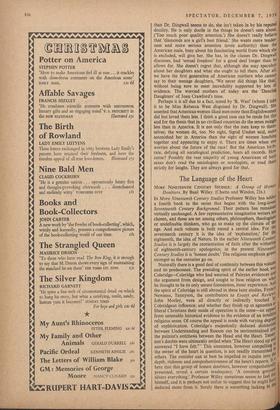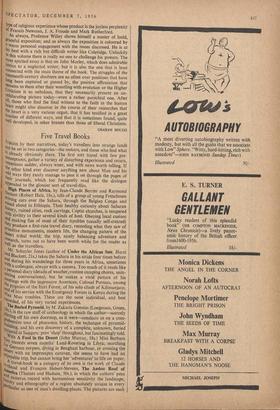The Language of the Heart
MORE NINETEENTH CENTURY STUDIES: A Group of Honest Doubters. By Basil Willey. (Chatto and Windus, 21s.) IN More Nineteenth Century Studies Professor Willey has added a fourth book to the series that began with the long-loved Seventeenth Century Background. Their pattern has remained virtually unchanged. A few representative imaginative writers ale chosen, and these are set among others, philosophers, theologians or undefinable thinkers, who go to make up the climate of de age. And each volume is built round a central idea. For the seventeenth century it is the idea of 'explanation,' for the eighteenth, the idea of Nature. In the earlier Nineteenth Centeill Studies it is largely the reorientation of faith after the withering of eighteenth-century apologetics; in the present Nineteenth Century Studies it is 'honest doubt.' The religious emphasis grows stronger as the centuries go on. Naturally there is a good deal of continuity between this volume and its predecessor. The presiding spirit of the earlier book was Coleridge—Coleridge who had wearied of Paleyan evidences and the argument from design, and sought to base religion on what he thought to be its only secure foundation, inner experience. M. the spirit of Coleridge is still abroad in these later studies. Franc's Newman, Tennyson, the contributors to Essays and Revie0' John Morley, were all directly or indirectly touched 11 Coleridgean influence; and whether they finish up as agnostics of liberal Christians their mode of operation is the same—an We'd from untenable historical evidence to the evidence of an intuit°e religious sense. Of course the appeal is made with varying degrees of sophistication. Coleridge's majestically deduced distinction between Understanding and Reason can be sentimentalised into the palmist's antithesis between the Head and the Heart. Tell'i son's doubts were ultimately settled when 'The Heart stood up an answered "I have felt."' This assurance, however compelling to the owner of the heart in question, is not readily transmitted t° others. The outsider can at best he impelled to inquire into the
14. '5 depth, richness and comprehensiveness of the heart's reports. P; here that this group of honest doubters, however sympathetic
all.Y presented, reveal a certain inadequacy. 'A common greyor
1, 5
silvers everything.' Professor Willey sometimes seems to feel 1■•1 himself, and it is perhaps not unfair to suggest that he might have deduced more from it. Surely there is something lacking in the type of religious experience whose product is the joyless perplexity Of Francis Newman, J. A. Fronde and Mark Rutherford.
As always, Professor Willey shows himself a master of lucid, graceful exposition; and as always the exposition is coloured by warm personal engagement with the issues discussed. He is at his best with a rich but difficult writer like Coleridge. Unluckily In this volume there is really no one to challenge his powers. The most spirited essay is that on John Morley, which does admirable Justice to a neglected writer; but it is also the one that is least Connected with the main theme of the book. The struggles of the nineteenth-century doubters are so often over positions that have tong been captured or passed by, the positive affirmation that ,„rernains to them after their wrestling with evolution or the Higher eriticism is so nebulous, that they necessarily present an un- exhilarating picture today—even a rather parochial one. After those who find the final witness to the faith in the human heart might also discover in the course of their researches that the heart is a very various organ, that it has testified in a great number of different ways, and that it is sometimes found, quite Well developed, in other breasts than those of liberal Christians.
GRAHAM HOUGH



































 Previous page
Previous page